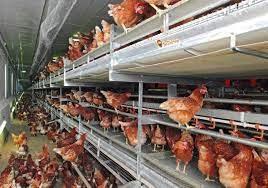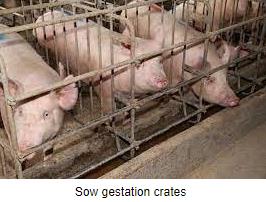
The Supreme Court of the United States (SCOTUS) rendered an opinion on the constitutionality of California Proposition #12 on May 11th following oral arguments heard on October 11th, 2022. In a 5 to 4 decision, SCOTUS denied the petition submitted by the National Pork Producers Council, et al. and affirmed the opinion of the 9th Circuit Court that Proposition #12 was constitutional.
The petitioners claimed that Proposition #12 contravened the dormant Commerce Clause. They based their arguments on the contention that states are enjoined from issuing and enforcing regulations that have economic outcomes independently of legislation enacted by Congress. The majority opinion stated “ The Commerce Clause prohibits enforcement of state laws that are driven by economic protectionism-that is, regulatory measures designed to benefit in-state economic interest by burdening out-of-state competitors.” This is an established principle in case law. The Petitioners largely based their case on the precedent established by Pike v Bruce Church, Inc. This case involved a law passed by the state of Arizona requiring that cantaloupes should be processed and packed in the state before shipment beyond the borders of Arizona.

In the majority opinion written by Justice Gorsuch, the argument based on Pike “Falters out of the gate.” In the opinion of the Court, the petitioners overstated the extent to which Pike and its derivatives departed from the antidiscrimination rule that lies at the core of Commerce Clause jurisprudence. The petitioners claimed that Proposition #12 would require a “massive disruption of the pork industry”. Gorsuch noted, “If pig husbandry really does imperatively demand a single uniform nationwide rule, they are free to petition Congress to intervene.” This, in fact, may represent the next approach by the National Pork Board.
The opinion noted, “This Court has inferred an additional judiciary enforceable rule against certain especially discriminatory state laws adopted even against the backdrop of Congressional silence. But ‘extreme caution’ is warranted before a court deploys this implied authority. Petitioners would have us cast aside caution for boldness. They have failed-repeatedly-to persuade Congress to use its express Commerce Clause authority to adopt a uniform rule for pork production. The opinion continued “In-state petitioners invite us to endorse two new theories of implied judicial power. They would have us recognize an almost per se rule against the enforcement of state laws that have extra territorial effects even though this Court has recognized that virtually all state laws create ripple effects beyond their borders. Alternatively, they would have us prevent a state from regulating the sale of an ordinary consumer good within its own borders on nondiscriminatory terms, even though the Pike line of cases they invoke has never before yielded such a result”.

It must be remembered that the National Pork Board effectively scuttled the establishment of a federal standard for housing of laying hens that would have been included in the 2018 Farm Bill as the so-called ‘Egg Bill’. This would have established either barn housing or enriched colony modules as alternatives to conventional cages. The principles to have been incorporated in the proposed ‘Egg Bill’ arose from negotiations between United Egg Producers and the Humane Society of the United States. With the demise of the ‘Egg Bill’, the requirements of Proposition #12 and the 2016 Question #3 adopted Massachusetts, along with similar previously enacted welfare bills in other states imposed restrictions on livestock housing.
Proposition #12 does not enforce any specific requirements on a livestock producer outside California. The Proposition, however, does require that producers desiring to ship eggs and pork products to California must comply with the requirements that apply to producers in the State.
The issue of housing sows in gestation crates is more a question of acceptance by consumers and customers than the legal issue that has now been settled. There is considerable consumer and customer opposition to gestation crates that are regarded as “cruel” as defined in Proposition #12.
Faced with the reality of conversion from gestation crates incorporated in the text of California Proposition #2 adopted in 2008, many producers commenced a slow transition to group housing. This required capital investment and changes in the husbandry of sows and acceptance of deterioration in reproductive performance. It is estimated that forty percent of sows are currently held under conditions which approximate the requirements of California regulations. Major packers including Tyson Foods, Smithfield Foods and others have committed to a program of conversion to satisfy both state and customer requirements.
The egg industry, in contrast, embarked on a program of conversion that probably has incurred in excess of $5 billion for alternatives to conventional cages including retrofitted to existing suitable housing in addition to erection of new purpose-deigned buildings and complexes. At the present time, 38 percent of a nominal U.S. flock of 325 million hens is housed in other than conventional cages reflecting state legislation and customer demand. Despite coerced commitments made in 2018 by the restaurant segment, retail chains and other users of eggs to source from other than conventional cages by 2025, the pace of change has slackened. Many customers have extended their compliance dates and others have reneged on commitments. It appears the food service segment has complied but companies in this category have the ability to pass on higher cost of sourcing cage-free eggs to their end users including hospitals, universities, corporate dining and others. Some retailers have totally embraced Proposition #12. This is a function of corporate ownership and policies, multinational operation, consumer demographics and their buying power. Generally, it is accepted that by 2025 and for years thereafter, one third of all hens will be housed in either conventional cages or in enriched colony modules, since retailers require a range of appropriately priced eggs to satisfy consumer demand.
The progressive approach by the egg industry contrasts with a proportion of pork producers who are apparently unwilling or financially unable to convert from gestation crates to group housing of sows. The National Pork Producers Council were obviously disappointed in the ruling with Michael Formica, Chief Legal Strategist, stating, “This is more than just pork, this is about the freedom of farmers to make choices about how they operate.” This and similar sentiments are more for internal industry consumption than an expression of reality. The train left the station many years ago and conversion to group housing to satisfy domestic demand is now a reality.
Some observers have noted that the SCOTUS decision will embolden animal rights activists to become more aggressive. This contention may have some substance but essentially HSUS and kindred organizations have always and will continue with their efforts to dismantle the intensive livestock industry. They decline to present any alternative method to supply available protein in quantities and at a cost equivalent to current production.
In evaluating the SCOTUS ruling, it is evident that it will have little bearing on the egg industry that has invested in alternatives to conventional cages with future developments based on customer and consumer demand and advances in technology.
The egg industry should avoid indulging in schadenfreude, a unique Teutonic sentiment of enjoying pleasure at the expense of another. This admonition is advanced in the recollection that lobbying by the pork industry against a uniform federal standard to house hens, effectively cancelled a workable and welfare compliant alternative. Their opposition to the ‘Egg Bill’ in 2018 was detrimental to our industry. We have been forced to adopt capital intensive aviary installations and endure higher production costs to achieve levels of efficiency achievable with enriched colony modules and barn housing.